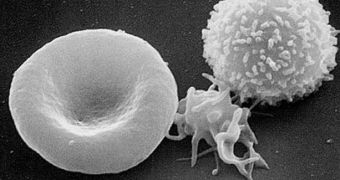Obesity is known to be one of the main causes why people begin to develop a host of other conditions and also become vulnerable to the effects of external pathogens. For instance, those with too many extra pounds may suffer from diabetes, heart conditions, a lack of physical condition and muscle tone, as well as catch the new swine flu faster than people of normal weight. Researchers have known for some time that all the extra fat inside these people forces their immune system to work harder, producing inflammation. Now, experts believe they may have found the protein that is responsible for triggering the chain of events that leads to inflammation, NewScientist reports.
The main element that dictates the body's immune response to obesity appears to be a protein called TLR4. In a new series of experiments, scientists at the University of California in San Diego (UCSD) used specific chemicals to destroy all immune-system cells known as macrophages in the bone marrow of a group of lab mice. Then, they injected the unsuspecting rodents with a new series of macrophages that had been previously engineered so that they did not express the TLR4 protein.
A group of genetically altered mice and a group of normal, test rodents were then subjected to a high-fat diet, which, surely enough, forced them to gain weight and become obese. The scientists then looked at the differences that existed between the two groups. They noticed that the bodies of mice that had been given the modified macrophages were just as fat as normal, but that they did not exhibit any signs of inflammation. The work was led by expert Jerrold Olefsky.
The UCSD team also noticed that the insulin production in the modified mouse strain also continued undisturbed and without spikes. Normal levels of immune system-related chemicals were also observed, which was not the case in the normal mice that expressed them in higher amounts, just like humans do. Macrophages were noticed in the belly fat of normal, obese mice, but not in the gut of those engineered to lack the TLR4 protein. This led the scientists to the conclusion that the protein somehow played a major role in creating all these negative side-effects, usually associated with obesity in humans.
The new results provide a new avenue of research in the field of treating obesity and related conditions. Targeted drugs that would only seek to destroy TLR4 could be mass-produced within a few years, and they may help those people who are obese because they are sick. For those who get so large because they eat junk food, and don't work out, a change in lifestyle may be more appropriate than a drug treatment. Details of the UCSD work appear in the latest issue of the scientific journal Cell Metabolism.

 14 DAY TRIAL //
14 DAY TRIAL //